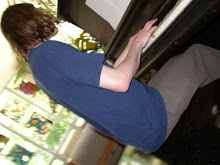Thursday, July 24, 2008
Review in Galatea Resurrects
The newest issue of Galatea Resurrects contains a review of Oranges & Sardines from Eileen Tabios and a wonderfully long consideration of the Editor's Letter. Read the review here, and if you haven't read the first issue of Oranges & Sardines, read a copy online here.
Labels:
Galatea Resurrects,
Oranges and Sardines,
Poetry,
Review
Wednesday, July 16, 2008
The work that Otomo Yoshihide has been doing for the last ten or fifteen years has so beautifully taken a step beyond noise rock. His work is capable of being gentle and beautiful in a way that few other "noise" musicians are able.
Labels:
Contemporary Music,
Japan,
Noise,
Otomo Yoshihide,
Sachiko M
Thursday, July 10, 2008
Monday, July 7, 2008
America: a Prophecy


Early this month, I read Blake's America: a Prophecy. With the fourth of July arriving and the war continuing, it seemed to fit the moment.
I've loved Blake since my mid-teens: The Book of Urizen was the first of the prophetic books that I read and it was a major text from that time in my life. The prophetic books attracted me as someone entering writing, I think, as Blake's vision enwraps like a dream does, and they attracted me spiritually, as the demiurge styled Urizen--a vain Old Testament god--was unlike anything I had come upon in conventional Christianity and Blake's rewriting of Genesis gave myth a life I had never before experienced.
Since Urizen I've read a number of other prophetic books, but I hadn't gotten around to reading America before. I'm not sure why--it's one of the more famous prophetic books, it's a quick read (so time is no excuse), and from second-hand accounts, I expected it to be a powerful text. It might be that the text connects to Blake's work about the other continents, and reading across the world is a more daunting task. Or maybe it's that I'm nervous about historical prophecy.
But if historical prophecy has, in the past, kept me from reading America, this month it urged me toward it. I've been trying to think through a segment of Robert Duncan's essay "Changing Perspectives in Reading Whitman":
The oracular mode enters poetry and history where profound contradictions come
into play. In the widening of what we call the credibility gap, incredible
transformations may come into the statement of truth. Oracles are to be read
many ways or both ways.
I take Duncan to mean that there are specific historical moments when it is possible to make truth statements that don't function like traditional truth statements--one cannot say that they are either true nor false. This may be possible through the traditional Hegelian dialectic; when there is conflict, war, a strong pull between two established designs for the world (thesis/antithesis, north/south), it is possible for a third voice to make an oracular statement. As in the Hegelian synthesis, this third voice neither affirms nor denies the prior voices and this third voice is not even possible (or at least comprehensible) without the passing of the prior voices. The third voice is oracular, insofar as it imagines the whole of the conflict and imagines beyond the conflict; the statement moves toward its own possibility and into its own comprehensibility.

America does imagine the whole of the conflict. The necessity of rebellion is affirmed and argued for, but the violence of rebellion appears as a dangerous fire, a fire that consumes and continually threatens to rage beyond any control. Orc, the figure of rebellion, arrives as demonic, and while Blake champions the desire and freedom of Hell, here he recognizes the danger that can/will come (historically, the even bloodier French Revoloution).
Does America imagine beyond the conflict of the American Revolution? I think it does, but I'm still trying to understand how. America isn't purely about the American Revolution--Blake is trying to describe the action of control and resistance and show the Revolution as the enactment of a type of movement. But I'm sure there's more. I might still be at a loss because I haven't seen the movement, the motion in it's entirity: it's preceeded by Africa (in The Song of Los) and followed by Europe.
I'm continuing to consider Duncan's thoughts on oracle. I wish that more writers were thinking about this mode, either in Duncan's conception or in some other manner. I remain nervous about oracular claims, as the obvious danger of hubris and moral superiority sit with such statments. I imagine these dangers put off other poets as well.
But fear doesn't mean the oracular mode shouldn't be considered (just as the consideration doesn't mean a blank check should be given to all fortune telling). As a way to engage with the world, with events in the world and as a way to engage with history through a full imaging of possiblity instead of simplistic moralizing, the oracular mode shouldn't be abondoned, even if it needs to be radically re-envisioned for contemporary society.


Labels:
America,
Oracular Poetry,
Poetry,
Robert Duncan,
The Book of Urizen,
Whitman,
William Blake
Kiki Gallery
Over on Denis Cooper's blog, Kevin Killian has posted memories about the Kiki Gallery from San Francisco back in the 1990's. Kevin is running a show in San Francisco about the gallery from now until August 2. If you're in the area, make me jealous and go to the show.
Read Kevin's post here.
Labels:
Contemporary Art,
Kevin Killian,
Kiki Gallery,
Rick Jacobsen
Subscribe to:
Comments (Atom)
